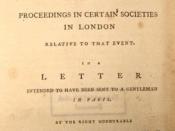Freedom of speech was not as significant in the 18th century as it is today. The British government had an overlying power of the way things were run and ruled. King George III was widely followed, but was greedy for more power and less justice for the people. Edmund Burke found himself desiring to represent society and set up a separation from the king and parliament. Burke set out to change the government through his writings and speeches. He wanted the struggling American Colonies to be set free from their inconsistent ruling from a sea away. Burke sought after the relieving of Irish Catholics, in a way that separated the church from the Monarchy of George III. He was instrumental in swaying official's opinions and views in very controversial issues, and was able to transform government power as we know it today. The philosophy of separation of government has made an important change and can be credited to the relentless and unforgiving standpoints of Edmund Burke.
Edmund Burke did not grow up pursuing a life of politics, but he sought after a career in legal studies. He grew up in an Anglican household but was swayed also by his mother's strong Catholic ties. In his early education he attended a Quaker school in Ballitore, and then proceeded to Trinity College in Dublin (Somerset). Burke trained in his literature skills as well as his oral debating skills. He formed a debating club which later molded into the Historical Club and merged into the College Historical Society (Burke). Persuaded by his parents Burke began to study the law, but was soon loosed of his education to travel Europe. Traveling the continent he became very familiar with the complaints of Europeans with their rebellion towards King George III. Burke found himself becoming...
![[Howth and Ireland's Eye. County Dublin, Ireland] (LOC)](https://s.writework.com/uploads/1/13399/howth-and-ireland-s-eye-county-dublin-ireland-loc-thumb.jpg)

